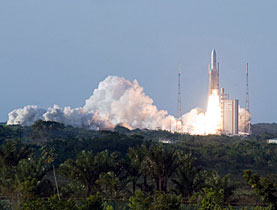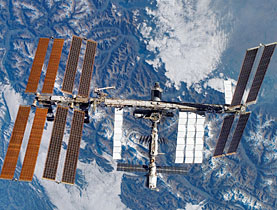Swiss boldly go forward in space policy

Although small and with no rocket programme of its own, Switzerland has announced that it is to strengthen its commitment to cosmic exploration.
The country is a founding member of the 40-year-old European Space Agency (Esa). Last week the Swiss government revised its policies to help ensure that the Swiss remain key players within the agency and in space.
For years Switzerland has had a galaxy of policies in place, in areas such as research and technology and through memberships in groups like the United Nations Office for Outer Space Affairs.
Now the government has consolidated and strengthened these policies to give the country a clear directive in space. This could mean more Swiss components making it onto rockets, as well as the development of more advanced technologies.
“For the first time we have a space policy from a national view,” Urs Frei, a scientific adviser with the State Secretariat for Education and Research, told swissinfo.
“Switzerland could have said, ‘We’re too small, we will never get to space on our own, why bother’? But no, the government instead has said, ‘Space is important for us and we want to activity participate’.”
Swiss sidelined?
Switzerland currently contributes around €90 million (SFr137 million) a year to Esa. This is around three per cent of the total budget.
Experts are worried that non-EU member Switzerland risks seeing its influence diminish as new EU countries come into the fold.
“We had to think about what this means for Switzerland,” Frei said.
Moreover, with the rise of China and India as new players in space, Esa needs to remain competitive if it wants to preserve its status. But developing better rockets and technologies, such as more efficient payloads and precise controlling systems, takes more resources.
This is where the Swiss could ensure they are not overlooked, the new policy states. The country has an “enviable” role with manufacturers able to provide highly engineered, mission-critical hardware.
Satellites rely on Switzerland’s unrivalled atomic clocks. And technological spin-offs developed at Swiss universities have increased satellite capabilities, such as imaging that looks for instabilities in the Alps.
“Our country must be a competitive partner, reliable and unable to be ignored,” the Swiss interior ministry wrote in its policy report.
Developing new technology and integrating it into a European space programme is “an indispensable element in the prosperity of our country,” it added.
Peacemakers in space
To that end, the new policies aim to foster high-tech industry, scientific research, and the development of rocket components, while supporting an international and peaceful use of space.
However, the source of funding for these measures is not yet clear.
“But [the policy] acknowledges that these projects are becoming more and more important and that they are of a benefit to Swiss users,” Frei said. “Those users will have to share in the obligation.”
Switzerland has another obligation – to continue its reputation as an international peacemaker into a new dimension.
“The placement of arms in space and the development of anti-satellite weapons are under study in certain countries,” the report states. “If realised, this could have serious consequences on the peaceful use of space. Switzerland will have to work to prevent this.”
swissinfo, Tim Neville
Switzerland was one the founders of the European Space Agency.
The Swiss space industry includes 28 research institutes and 54 companies.
They specialise mostly in ground equipment, optical apparatuses, telecommunications systems, clocks, robotic machinery, microgravity research and weather surveillance.
Switzerland’s Claude Nicollier is an astrophysicist, test pilot and astronaut.
He was the first foreigner granted mission specialist status by Nasa and completed four missions on board the space shuttle.

In compliance with the JTI standards
More: SWI swissinfo.ch certified by the Journalism Trust Initiative











You can find an overview of ongoing debates with our journalists here . Please join us!
If you want to start a conversation about a topic raised in this article or want to report factual errors, email us at english@swissinfo.ch.